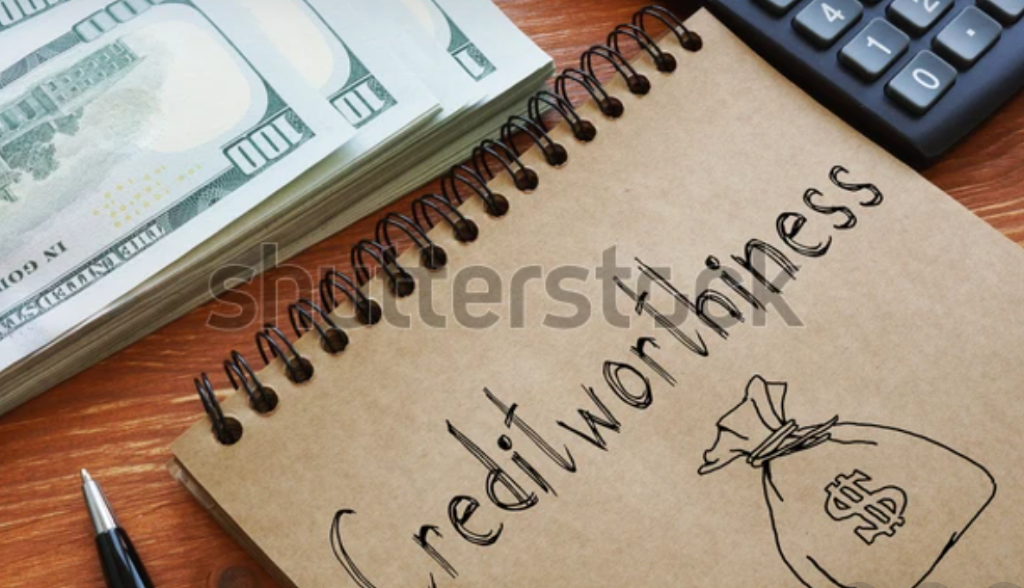What It Means To Be Creditworthy

- Creditworthiness is about a person's ability to repay a loan or debt.
- Having a high level of creditworthiness results in lower interest rates, fewer fees, and better terms and conditions on a credit card or loan.
- You can do several things to improve your level of creditworthiness.
LINK TO MAIN PHOTO: https://www.shutterstock.com/image-photo/creditworthiness-shown-on-conceptual-business-photo-1784521442
What Is Creditworthy?
Creditworthiness is about a person's ability to repay a loan or debt. A creditworthy borrower is one who a lender believes is willing, able, and responsible enough to make loan payments as agreed until the loan amount is repaid in full.
When you apply for a loan, your lender will consider your credit score to determine whether or not you're likely to repay the loan on time. They will also consider your income, amongst other financial factors.
When determining the likelihood of defaulting on a loan, some lending institutions consider available assets as well as the number of liabilities you have.
Recommended Read: The Difference Between Depreciating and Appreciating Assets
Knowing Your Creditworthiness
Your creditworthiness shows lenders that you are qualified for the loan or credit card application you submitted. The company's lending decisions are based on your previous credit management behavior. To accomplish this, they consider your entire credit history, credit score, and payment history.
Your credit report contains details about your debt burden, credit limits, overdrafts, and the current balances on all of your accounts. Additionally, it will highlight crucial information for the potential lender, including past due amounts, defaults, bankruptcies, and collection concerns.
Your credit score is another indicator of your creditworthiness, which is based on your credit report and measures you on a numerical scale. A high credit score indicates that you are creditworthy. On the other hand, low creditworthiness is caused by a low credit score.
https://www.shutterstock.com/image-photo/credit-score-check-online-business-loan-1754977202
To evaluate your creditworthiness, it's also crucial to consider your payment history. People having a history of missed payments, late payments, and overall financial irresponsibility are typically not given credit by lenders. Your credit report's payment history should show that you have always made all of your payments on time.
Your FICO score is calculated as 30% debt owed, 10% new credit, 15% length of credit history, 10% credit mix, and 35% payment history. Therefore, even if you have to make the minimum payment, you would want to maintain track of your payment history since it makes up the most significant portion of your credit score.
Your creditworthiness level will determine whether you can get a vehicle loan or a new credit card. The more creditworthy you are, the better it will be for you in the long run. Having a high level of creditworthiness results in lower interest rates, fewer fees, and better terms and conditions on a credit card or loan. The end story often translates into more money in your pocket. Furthermore, it has an impact on business finance, insurance premiums, and professional certifications and licenses.
Recommended Read: The Difference Between Assets and Liabilities
https://www.shutterstock.com/image-photo/car-auto-loan-transforming-assets-into-1094785640
Three C’s of Credit
Your credit score is determined by the three c’s of credit: character, capacity, and collateral.
Your character is the first thing that lenders look at when determining your creditworthiness. If you've been late on a payment before or had trouble paying off debts in the past, this will negatively impact your character score. On the other hand, a good character score reflects someone who takes their financial responsibilities seriously and pays their bills on time every month without fail.
Having a good relationship with your bank can increase your approval odds on a loan if you have less-than-perfect credit. Other than good rates, you can expect a shorter processing time and little to no paperwork.
Capacity refers to your financial situation. Lenders will look at how much money you can make and save each month and any assets you have that could be used as collateral. In essence, lenders compare your assets and liabilities. More liabilities than assets could signal to the lender that you are at high risk of not being able to make payments on time.
Collateral is property or money that can be taken away from you if you default on your loan payments. For example, if you take out a mortgage on your home, the lender can take back the house, also known as foreclosure, if you don't make payments on time.
Recommended Read: How to Invest and Build Wealth Without College
Tips for Increasing Creditworthiness
You can do several things to improve your level of creditworthiness. By far, the most important factor is establishing a relationship with your bank. Other factors include:
- Make payments on time
- Keep credit card utilization rates below 30%
- Strive to keep the debt-to-income ratio below 35%
- Have a mixture of credit
- Don’t close old accounts
- Only apply for credit when needed
Your debt-to-income ratio can be calculated by dividing your total monthly debt by your total monthly gross income.
You may also request a free copy of your credit reports from Equifax, Experian, and TransUnion. Check the accuracy of all the data and dispute any discrepancies. To support your dispute claim, offer supporting documentation. Inaccurate information can also be disputed with the organization reporting the mistake.
The Money Wrap-Up
Ultimately, it's about responsibility and trust. When you are creditworthy, it gives you the luxury to buy on credit without having to reduce your cash flow. The downside of not being creditworthy could cost you more than time, money, and your sanity. Once you have established yourself as not being creditworthy, it is hard to regain and maintain that trust.
Tell me, has your creditworthiness ever allowed you to shorten your process of obtaining financing or made your lending process smoother?